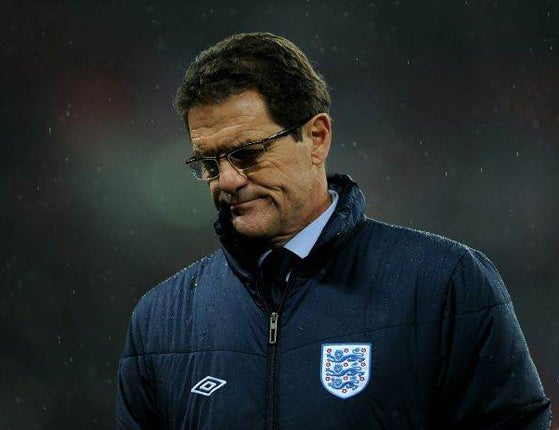James Lawton: Italian may now believe he can't help England

One complaint against Fabio Capello after England's undressing by France at Wembley is that his body language is losing much of its old intensity. He no longer strides into the technical area bristling with rage and indignation. He doesn't snort volcanically, as he did in Cape Town a few months ago, and say that he simply didn't recognise his team.
Maybe Il Capo has had enough, perhaps he should take the financial hit – he should, after all, be able to afford it given the career he has had – and say, "Arrivederci, England, I came, I saw and, on reflection, had about as much chance of conquering as a unit of Dad's Army let loose on a Panzer division."
If that sounds fatalistic, defeatist, and in any way a dereliction of honour or duty, you cannot have noticed that France were playing a completely different game on Wednesday night.
Some of it Capello – with due consideration of national characteristics and strengths which, in the past, have drawn the admiration of such great football men as Johan Cruyff and Franz Beckenbauer and should never be abandoned – has been trying to add to the English game over the last few years.
Those who say that his body language has dwindled cannot have noticed his expression at moments on Wednesday. It was that of a transplant surgeon resigned, after initial encouragement, to the fact that the graft would probably never take – at least not until the organisation and the priorities of English football undergo the most radical transformation.
One of the great absurdities of the current pressure on Capello, including the yapping of the Liverpool fitness coach, who complained that the England manager played Steven Gerrard for too long and at some greater risk of injury, is that his performance is now being examined in relation to those of such as Sven Goran Eriksson and Steve McClaren.
Eriksson is getting the higher rating because he twice got England to the World Cup quarter-finals, while Capello's campaign ended ingloriously in the round of 16. It is a fool's debate because the reality is that every coach, good, bad or indifferent, trying to succeed 1966 winner Sir Alf Ramsey has met with the same fate.
They have been ambushed, one by one, by their own football culture. Ramsey succeeded because he cleverly exploited, along with home advantage, his knowledge of the strengths and weaknesses of the English game. He also had three truly world-class players, Banks, Moore and Bobby Charlton and five or six borderline cases.
It was hardly an awesome performance by France this week, certainly not in comparison to the blinding revelation experienced by Ramsey and his England team-mates when Hungary arrived at the old stadium in 1953, but it still pointed to a huge gulf between expectation and execution.
England lacked key players and had young ones desperate to have their inexperience underpinned by more knowing team-mates. Mostly, they were lost. You may say this was Capello's fault, and to an extent perhaps it was, but, unlike Laurent Blanc, he is burdened with the challenge of imposing a way of playing and thinking that in the front-rank football nations is imposed soon after the cradle.
Ramsey was deeply scarred by his Hungarian experience. It was the spur for everything he did to make England competitive on the international stage. "I had never felt so powerless on a football field," he reflected much later. "I knew so much had to change." We're still waiting, Alfie.
Join our commenting forum
Join thought-provoking conversations, follow other Independent readers and see their replies
Comments